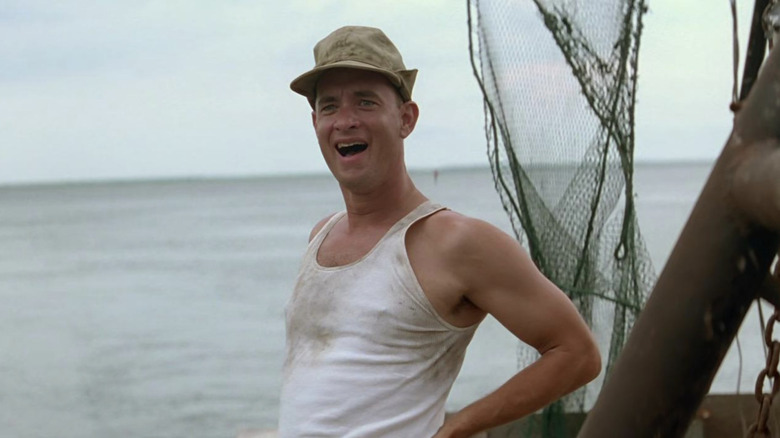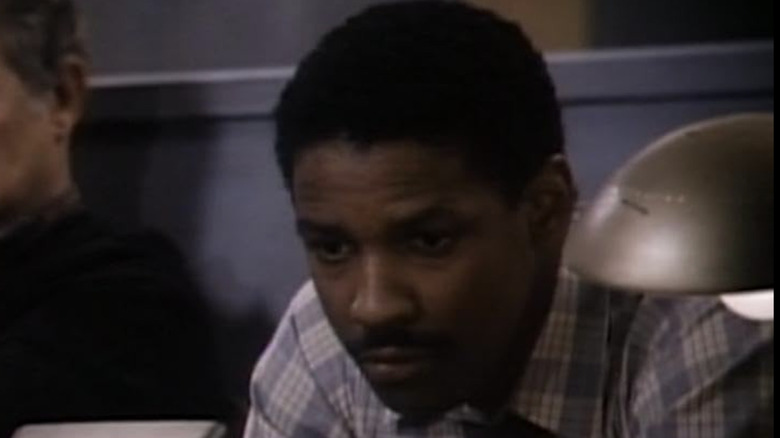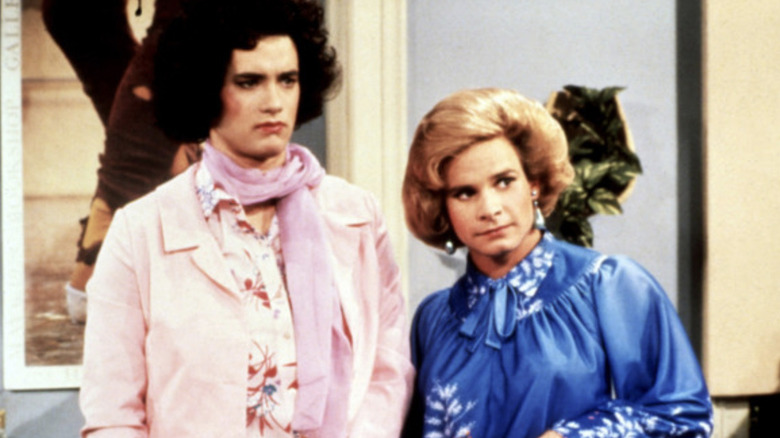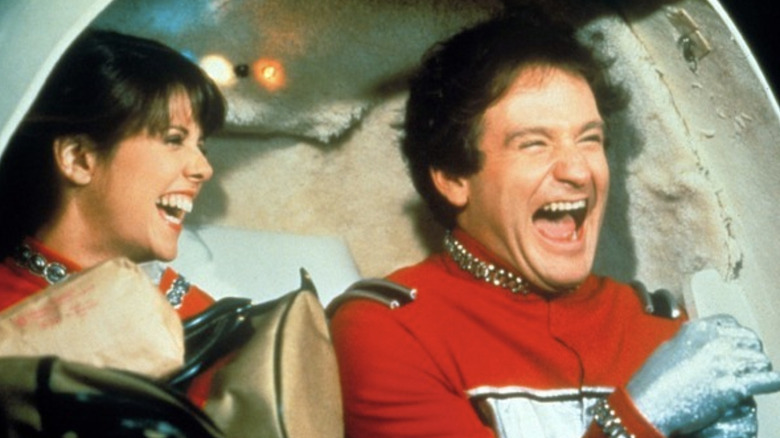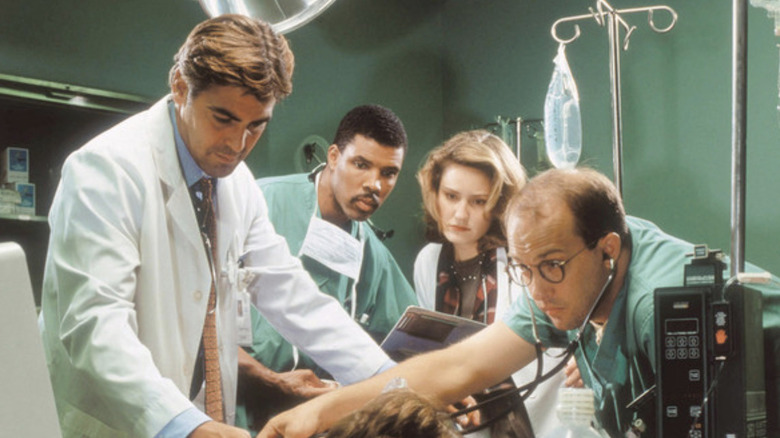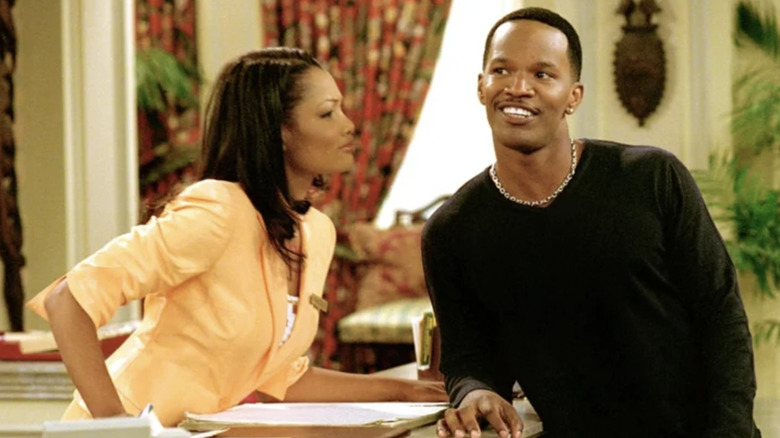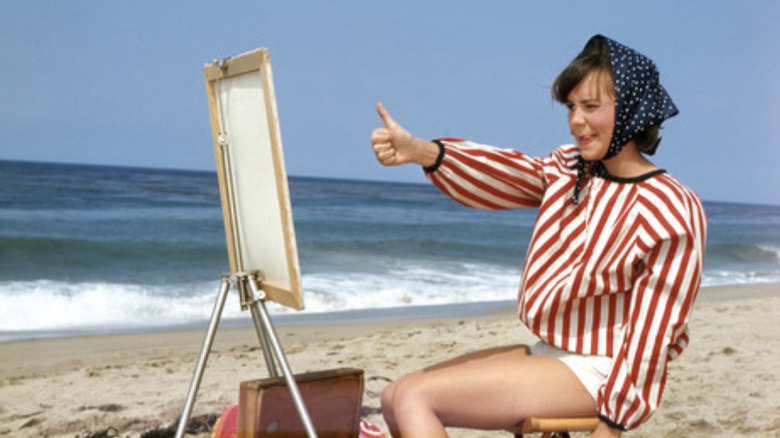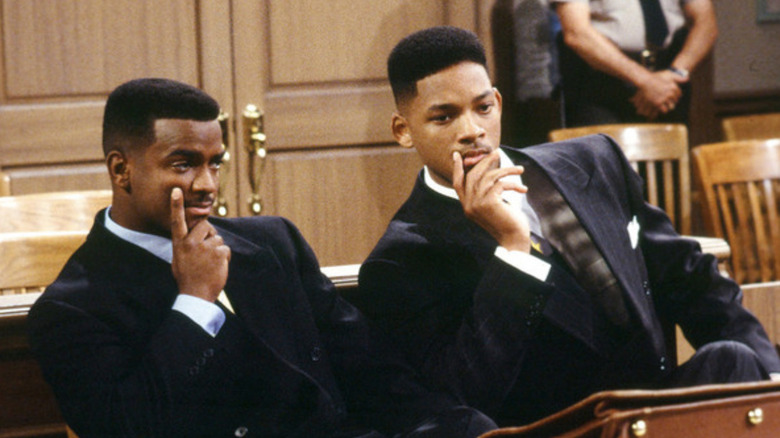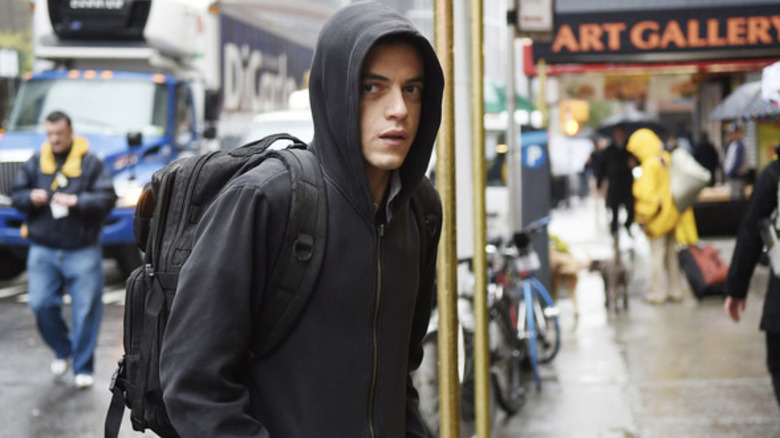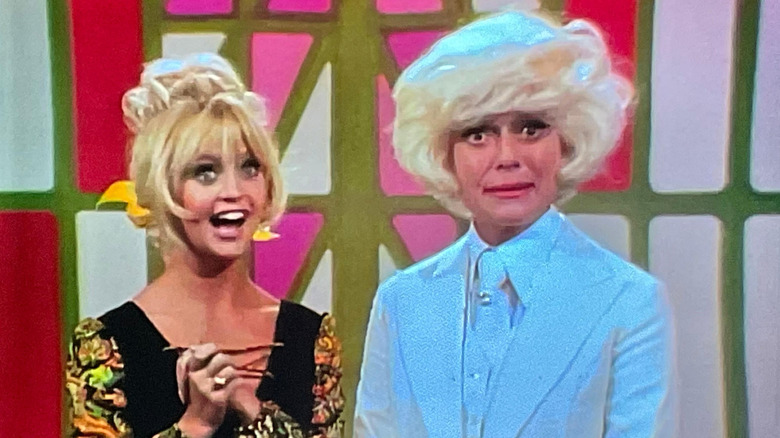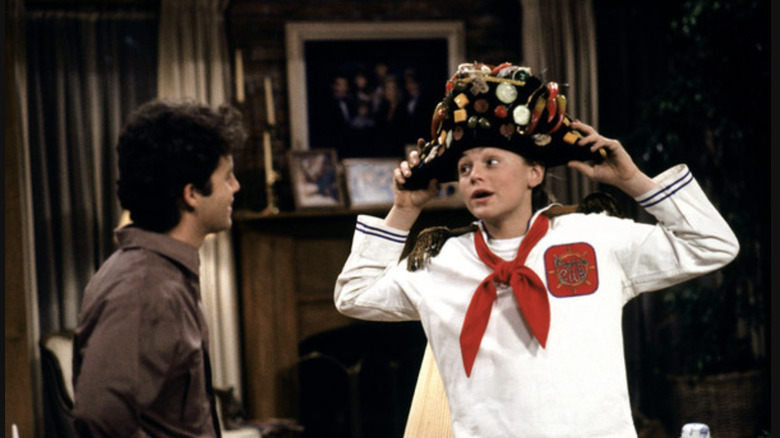10 Oscar-Winning Actors Who Started On TV
Once upon a time, it was commonly believed that TV stars couldn't become movie stars. It may seem an outdated and weird thing to say today, but it was a logical viewpoint at the time. It was also backed up by the evidence. Lucille Ball was the biggest TV star in history, but wasn't exactly a butts-in-seats box office draw. Neither were Milton Berle, Jackie Gleason, Red Skelton, or other big TV entertainers of the time. But that all changed when "Rawhide" TV star Clint Eastwood (who didn't make our list below, since his Oscars were for directing and producing, not acting) took some film gigs in Italy starring as "The Man With No Name" — and never looked back.
Today, TV is a frequent stepping stone to movies, and ever since Matthew McConaughey and Woody Harrelson starred in HBO's "True Detective," TV has been a legitimate medium for movie stars, too. But even though the prejudice against TV is long gone, the richest prize in on-screen acting isn't the Emmy or Golden Globe: It's the Academy Award, and many movie stars who have a shiny gold guy in their trophy collection also cut their teeth working in TV. Keep scrolling for a look back at 10 film actors who got their start on the small screen.
Denzel Washington
Denzel Washington is one of the few movie stars known by his first name alone. There are the Chrises (Hemsworth, Pratt, Evans, Pine) and the Toms (Hanks, Cruise, Holland, Hardy), but there's only one Denzel. With more than $4.9 billion in global box office, there's a reason Washington is on a first-name basis with moviegoers.
Washington got his start playing small parts in TV movies like "Wilma," "Flesh & Blood," and "Coriolanus." He eventually made his big-screen debut in 1981's "Carbon Copy," playing George Segal's son. "But wait, wasn't George Segal white?" you're probably thinking. Yes, that was the joke, and it was as cringe as it sounded. What can we say, the 1980s were a different time.
"Carbon Copy" didn't exactly make Washington an overnight movie star, but he did land a lead role in NBC's hospital drama "St. Elsewhere" in 1982. In a landmark lead role for an African American actor, Washington played Dr. Phillip Chandler and was one of the few actors to appear on the series until it ended in 1988. By the end of its six-year run, Washington already had an Oscar nomination to his name for 1987's "Cry, Freedom" — his first of nine Oscar nods for acting. In 1990, Washington won Best Supporting Actor for "Glory" and Best Actor in 2002 for "Training Day." So that's mister Denzel Washington to us.
Tom Hanks
With his everyman appeal, Tom Hanks has crafted a persona as "America's dad." But with a phenomenal $11.8 billion in global box office receipts, Hanks is more than just the guy next door. He has also earned six Academy Award nominations, winning two — for 1993's "Philadelphia" and 1994's "Forrest Gump." In fact, Hanks is one of only four back-to-back Oscar winners in history, joining the ranks of Spencer Tracy, Luise Rainer, and Katharine Hepburn. Hard to believe Hanks' career started very differently.
Hanks' first screen credit was a micro-small part in the schlocky horror flick "He Knows You're Alone" in 1980, but he soon made his way to TV with one-and-done bit parts in "The Love Boat," "Happy Days," "Taxi," and "Family Ties." However, his most famous TV run was on the ABC sitcom "Bosom Buddies" as Kip/Buffy Wilson, one of two single ad men (opposite Peter Scolari) who disguise themselves as women in order to live in the only apartment they can afford... in a women-only complex. So basically "Mrs. Doubtfire," but with an apartment instead of child visitation rights. "Some Like It Hot" this was not, as "Bosom Buddies only ran two seasons before being canceled. Still, Hanks has fond memories of the show, especially his co-star.
Robin Williams
The late, great Robin Williams spent pretty much his entire career bouncing between media and genres (and we do mean "bouncing" literally), so going from TV to movies to TV was a piece of cake for the man of a thousand faces. Williams got his start as a standup star, which he parlayed into TV roles on everything from "The Richard Pryor Show" to "Laugh-In." But his most important TV part came in Season 5 of "Happy Days" as Mork from the planet Ork. (The fifth season of "Happy Days" also featured the infamous "jump the shark" episode, so Williams' portrayal of a type-A alien was on brand.) Williams' two episodes impressed execs enough to give the extroverted extraterrestrial his own show opposite Pam Dawber, "Mork & Mindy," which ran for four seasons from 1978 to 1982.
While Williams landed lead roles throughout the '80s, his A-list movie career didn't truly take off until 1987's "Good Morning Vietnam," which established his unique ability to blend laughs with tears. Williams reinvented himself again as a voice actor in "FernGully: The Last Rainforest" and "Aladdin" (both 1992), becoming one of the first A-listers to do voice work before it became du jour. By the late 1990s, Williams cemented his status as a dramatic actor with his Academy Award for Best Supporting Actor in "Good Will Hunting."
George Clooney
With his matinee idol looks and movie star charisma, you'd have thought George Clooney would have shown up on a movie set the second he set foot in Los Angeles. Alas, Clooney bounced around for nearly two decades before catching his big break. In fact, Clooney had pretty much established himself as a journeyman TV actor, with recurring appearances on programs like "The Facts of Life" (17 episodes), "Roseanne" (11 episodes), "Bodies of Evidence" (16 episodes), "Sisters" (19 episodes), and even the short-lived mid-80s sitcom "E/R" (8 episodes). However, it was another "ER" that would change Clooney's career.
Based on a concept by Michael Crichton, "ER" ran for 15 seasons on NBC — the first five (1994 to 1999) featuring Clooney as Dr. Doug Ross — and quickly became a massive hit. Clooney started lining up lead parts in movies (though one of those roles nearly killed the "Batman" franchise). While Clooney's biggest hits have come opposite bigger stars (Sandra Bullock in "Gravity," Brad Pitt and Matt Damon in the "Ocean's Eleven" movies, Mark Wahlberg and a giant wave in "The Perfect Storm"), his persona as the "Mayor of Hollywood" has established him as a permanent fixture on the A-list. In 2006, he won the Best Supporting Actor Oscar for "Syriana," while also being nominated for "Good Night, and Good Luck" (Best Director and Best Original Screenplay) that same year. Remembering his roots, Clooney returned for an episode in the final season of "ER."
Jamie Foxx
Jamie Foxx had a pretty good year in 2005, as he was nominated for his first Academy Award — twice. He earned Oscar nods for Best Supporting Actor in "Collateral" and Best Actor for "Ray." While Morgan Freeman beat him in the former category, Foxx took home the gold for "Ray" after turning in a transformative performance as the legendary singer-songwriter and pianist Ray Charles.
Foxx got his start in standup, which landed him a gig as a featured player on the sketch comedy show "In Living Color" from 1991 to 1994. His most famous character was Wanda Wayne, the ugliest woman in the world, though the biggest beneficiaries of "In Living Color" were Damon Wayans and Jim Carrey. Still, Foxx got his own self-titled TV show (the Mount Olympus for stand-up comics) with "The Jamie Foxx Show" from 1996 to 2001, and soon enough landed roles in Oliver Stone's "Any Given Sunday" and Michael Mann's "Ali," showing he had acting chops. Since then — especially after his one-two punch of "Collateral" (also for Mann) and "Ray" in the same year — the former funnyman has established himself as a top-tier thesp.
Sally Field
While Sally Field is oft-quoted as saying, "You like me, you really like me" upon receiving her second Oscar for "Places In The Heart" in 1985, she really said, "I can't deny the fact that you like me. Right now, you like me." Either way, folks had liked Field for a while, as she already had another Oscar to her name — Best Actress for "Norma Rae" in 1980. Field's first appearance was in an uncredited role in 1962's "Moon Pilot," before she landed the lead in ABC's "Gidget," based on the 1957 novel and 1959 movie (starring Sandra Dee in the role). Alas, the cheeky comedy about a winsome California teen wasn't as successful as a TV show as it had been as a book and movie, so "Gidget" got canned after one season.
Field didn't stay down for long, as she booked the much more successful "Flying Nun," which ran on ABC for three seasons (1967 to 1970). After "The Flying Nun" got grounded, Field spent the next seven years picking up TV parts, with her longest run being 22 episodes on "The Girl With Something Extra." It wasn't until 1977 that Field landed her star-making role opposite one of the biggest movie stars at the time, Burt Reynolds, in "Smokey & the Bandit." Moviegoers really liked her, and she hasn't looked back since.
Will Smith
Will Smith's films have earned more than $10 billion at the worldwide box office, but what's even more impressive is his $303 million worldwide average. While Smith spent most of his career playing versions of himself (with variations depending on the genre), he has shown his greatest range playing real-life people. There's Muhammad Ali in "Ali" (which earned him his first Oscar nod), Chris Gardner in "The Pursuit of Happyness" (his second nod), and Richard Williams in "King Richard" (which won him his first Academy Award).
Alas, the night of Smith's greatest career triumph was also the night he smacked Chris Rock, which made most of the headlines. But he bounced back with his next movie, "Bad Boys: Ride or Die," which made $400 million worldwide. Smith has always had a strong relationship with his fanbase (even 1999's critically panned "Wild Wild West" made $221 million), going all the way back to his days as PG-rated hip hop artist The Fresh Prince. Smith parlayed his fame as the family-friendly rapper into a top-rated TV show "The Fresh Prince of Bel-Air," which ran for six seasons on NBC from 1990 to 1996. "The Fresh Prince" ended on May 20, 1996; less than two months later, on July 2, 1996, Smith starred in the biggest hit of the year, "Independence Day."
Rami Malek
Rami Malek is the youngest person on this list, and while there has been significant pushback on whether he deserved his Academy Award, it's a simple fact that he has one (and that he got his start on TV). Malek's first credited role was in "Gilmore Girls," which he followed up with one-and-done bit parts in movies, TV shows, and even video games. He finally got semi-steady work with 21 episodes of the Fox sitcom "The War At Home," then once again went back to bouncing around projects, including the "Night at the Museum" movies, the "Halo" video game franchise," and Netflix's "BoJack Horseman."
In 2015, Malek got his big break playing Elliot Alderson on USA Network's "Mr. Robot" from 2015 to 2019. During his 45-episode run, he found time to play Freddie Mercury in the 2018 film "Bohemian Rhapsody," initially for Bryan Singer (until he was fired for... lots of things) and then for Dexter Fletcher. Regardless of who was behind the camera, Malek's work in front of it helped power the Queen biopic to just shy of $900 million worldwide, still the highest-grossing musical biopic by more than half a billion dollars. Malek ultimately took home the Best Actor Oscar for his portrayal of Mercury, topping Christian Bale in "Vice," Bradley Cooper in "A Star Is Born," Willem Dafoe in "At Eternity's Gate," and Viggo Mortensen in "Green Book."
Goldie Hawn
Goldie Hawn certainly warrants her first name, as her road to Oscar gold was short. The Washington, D.C.-born actress' first credited gig was 20 episodes on CBS' "Good Morning World" as Sandy Kramer from 1967 to 1968. Next, she appeared in 45 episodes as a featured performer on "Rowan & Martin's Laugh-In" on NBC, with her most famous character being Sparkle Farkle. Hawn's bright, bubbly, and buoyant personality quickly gained the attention of movie producers and landed her a supporting role in 1969's "Cactus Flower," opposite Hollywood heavyweights Walter Matthau and Ingrid Bergman. In the film, Matthau plays a middle-aged dentist who agrees to marry his clingy 21-year-old girlfriend (Hawn). Thing is, the lying lothario has convinced his much younger lover he's married with three kids (spoiler alert: he's not), so his devoted nurse (Bergman) agrees to pose as his wife, even though she's loved her boss for years.
The classic screwball comedy was remade 42 years later with Adam Sandler and Jennifer Aniston in "Just Go With It," but not to nearly the same plaudits. Despite sharing the screen with Matthau and Bergman, it was Hawn who took home the Academy Award, winning Best Supporting Actress. She continued her A-list career throughout the '70s, '80s, and into the '90s, including another Oscar nom for "Private Benjamin" in 1980.
Leonardo DiCaprio
Leonardo DiCaprio has been hailed as "The Last Movie Star" by The Hollywood Reporter, and with nearly $7.5 billion in worldwide box office earnings, for a per-film average of $240 million, it's easy to see why. Even more impressive, he has starred in zero franchise films, while his most financially successful picture — the little indie drama named "Titanic" — absolutely did not sink, sailing away with a then-record $2 billion-plus worldwide. But despite DiCaprio's undeniable movie star credentials, he got his start on television — as a child star, no less.
At an age when most kids are playing Little League, DiCaprio was picking up parts in "Romper Room," the short-lived "The Outsiders" TV show, "The New Lassie," and "Roseanne." His first regular gig was 12 episodes of NBC's "Parenthood" from 1990 to 1991, followed by 23 episodes of "Growing Pains" from 1991 to 1992. However, DiCaprio's big-screen dreams were not to be denied, and he next starred in "This Boy's Life," impressing his co-star Robert De Niro; he hasn't gone back to TV since.
DiCaprio's "Boy's Life" follow-up, "What's Eating Gilbert Grape," earned him his first of six Oscar acting nominations. It wasn't until his sixth nomination, for "The Revenant" in 2016, that he finally took home the Academy Award for Best Actor in a Leading Role.
